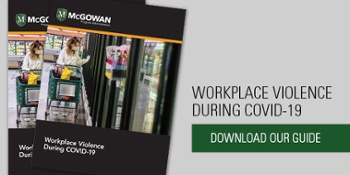Amid the chaos caused by the coronavirus and COVID-19 pandemic, people find themselves under enormous strain and pressure. They are worried about the health and safety of themselves and family members. They are facing financial stress due to reduced hours at work or losing a job. And they are concerned about shortages of essential items like medical supplies and groceries.
When people are under stress, they may react to ordinary situations in unusual ways that may include resorting to violence. Employers need to take steps to protect their employees and their customers from the virus itself. They also must deal with the fallout caused by the stress surrounding the pandemic.
Violence due to panic around COVID-19
As people are flocking to stores to stock up on food and other essential items, tensions are running high. Incidents of violence are increasing despite pleas from local, state, and national leaders for calm and understanding.
Not to mention the fear of COVID-19 is sparking prison strikes, protests, and riots around the world. While Italy is finally reporting lower daily death tolls in the country, the country is still on lockdown, and residents are reaching a breaking point. It’s not just the fear of catching the virus. It’s the idea that essential items such as food deliveries are being hijacked, and organized crime groups are waiting to exploit the situation.
Employers currently operating need to keep staff and the public calm and safe. Many people are still shopping at essential businesses such as pharmacies and grocery stores.
There are reports of violence at big-box stores like Costco and Sam’s Club as people are concerned about others respecting their personal space and the transmission of the virus. Staff members at hospitals and health clinics reported being abused by frustrated people waiting in long lines.
Employers must prepare to respond to workplace violence
During stressful times it is even more critical that a business implements its workplace violence program. Employees need to feel safe reporting to work. They must create and implement plans to reduce the threat of violence in the workplace.
Begin by identifying the threats your business and employees face, especially during this time of uncertainty. There are four types of workplace violence that employers must prepare for:
- Criminal intent — the perpetrator has no prior relationship with the victim or business, and the violence is usually incidental to another crime
- Customer or client — the perpetrator has a prior relationship with the business as a customer, client, patient, student, or inmate and becomes violent while being served by someone in the business
- Worker-on-worker — a current or former employee threatens another employee in the workplace
- Personal relationships / domestic violence — the perpetrator has a relationship with the victim but not the business, such as when a domestic dispute spills over into the workplace
During these uncertain times, a workplace could experience any of the four types of workplace violence. Employers should remind employees of the warning signs that may precede workplace violence. Review the company’s workplace violence protocols and conduct on-going training on how to handle customer complaints. Conduct refresher courses that teach employees effective conflict resolution strategies and how to respond in the face of escalating violence.
Employee privacy rights during a pandemic
Employers have an obligation to protect the health and safety of their employees but must do so within the bounds of applicable privacy laws. While employers might be tempted to ask employees about their medical conditions, employers must be careful, especially if that information is learned through an employer’s health plan.
If an employee comes to you with a health condition, that information is confidential. Managers must be told that a particular employee will be taking a leave of absence and will not be able to work. They do not need to know that a particular employee was infected with Coronavirus.
However, employers are also obligated to tell fellow employees that a colleague has tested positive for the virus. Employers need to take appropriate steps to self-isolate and get tested if they display flu-like symptoms. Employers should work with local health officials for guidance on how to notify fellow employees that a colleague has tested for COVID-19 while respecting the privacy of the infected employee.
Manage the risk with Active Shooter / Workplace Violence Insurance
McGowan Program Administrators offers Active Shooter / Workplace Violence insurance programs that help businesses manage the risk of violence in the workplace. The programs also train employees on how to respond if violence does strike. Our policies offer up to $250,000 in victim benefits and additional coverage for medical expenses. We work with all sizes and classes of businesses.
McGowan Program Administrators have more than 50 years of experience in the insurance industry and continue to remain focused on providing superior products and outstanding customer service, even during this time of crisis.
Learn more about our Active Shooter / Workplace Violence insurance program and contact us today for answers to your insurance questions.



